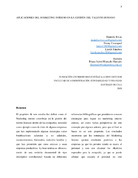Mostrar el registro sencillo del ítem
Aplicaciones del marketing interno en la gestión del talento humano
| dc.contributor.advisor | Hurtado Hurtado, Diana Isabel | |
| dc.creator | Rivas, Daniela | |
| dc.creator | Cuasapud, Fanny | |
| dc.creator | Sánchez, Liceth | |
| dc.date.accessioned | 2022-03-30T19:35:50Z | |
| dc.date.available | 2022-03-30T19:35:50Z | |
| dc.date.created | 2021 | |
| dc.identifier.uri | http://hdl.handle.net/20.500.12237/2291 | |
| dc.description | El propósito de este estudio fue definir como el marketing interno contribuye en la gestión del talento humano dentro de las compañías, teniendo como ejemplo casos de éxito de algunas empresas que han implementado algunas estrategias como bonificaciones salariales y no salariales, reconocimientos, formación, inclusión familiar y que han permitido que estas crezcan y sean empresas productivas. La base teórica se obtuvo a través de una revisión documental de tipo descriptivo correlacional basada en diferentes referencias bibliográficas que permitieron conocer estrategias para lograr un marketing interno exitoso, así como varias perspectivas de este concepto por algunos autores, pero que al final se basan en un solo propósito. Los resultados mostraron que las estrategias del Marketing Interno aportan resultados positivos a las empresas ya que les permite vender su marca al personal y con eso alcanzar los objetivos esperados para la compañía, ya que se puede afirmar que cuando el personal no está comprometido con la empresa, esta desmotivado e insatisfecho, y lo que se busca con el marketing es permitir al trabajador tener una mayor motivación, satisfacción y fidelización. Se puede concluir que algunas estrategias como la remuneración salarial y no salarial, la formación del personal, flexibilidad, el reconocimiento del trabajo entre otras descritas en la investigación, hacen parte del grupo de actividades que algunos autores aseguran ser efectivos para lograr un marketing interno y por ende la motivación, satisfacción y fidelización que necesitan las empresas para aumentar su productividad. | spa |
| dc.description.abstract | The purpose of this study was to define how internal Marketing contributes to the management of human talent within companies, taking as an example success stories of some companies that have implemented some strategies such as salary and non-salary bonuses, recognition, training, family inclusion and that they have allowed them to grow and become productive companies. The theoretical basis was obtained through a descriptive-correlational documentary review based on different bibliographic references that allowed knowing different strategies to achieve successful internal marketing, as well as different perspectives of this concept by different authors, but that in the end based on a single purpose. The results showed that Internal Marketing strategies bring positive results to companies since it allows them to sell their brand to the staff and thereby achieve the expected objectives for the company, since it can be stated that when the staff is not committed to the company, is unmotivated and dissatisfied, and what is sought with marketing is to allow the worker to have greater motivation, satisfaction and loyalty. It can be concluded that some strategies such as salary and non-salary remuneration, staff training, flexibility, job recognition among others described in the research, are part of the group of strategies that some authors claim to be effective to achieve internal marketing and hence the motivation, satisfaction and loyalty that companies need to increase their productivity. | spa |
| dc.format.mimetype | application/pdf | spa |
| dc.subject | Marketing interno | spa |
| dc.title | Aplicaciones del marketing interno en la gestión del talento humano | spa |
| dc.subject.subjectenglish | Internal marketing | spa |
| dc.rights.accessRights | info:eu-repo/semantics/openAccess | spa |
| dc.creator.degree | Especialista en Gerencia de Talento Humano | spa |

